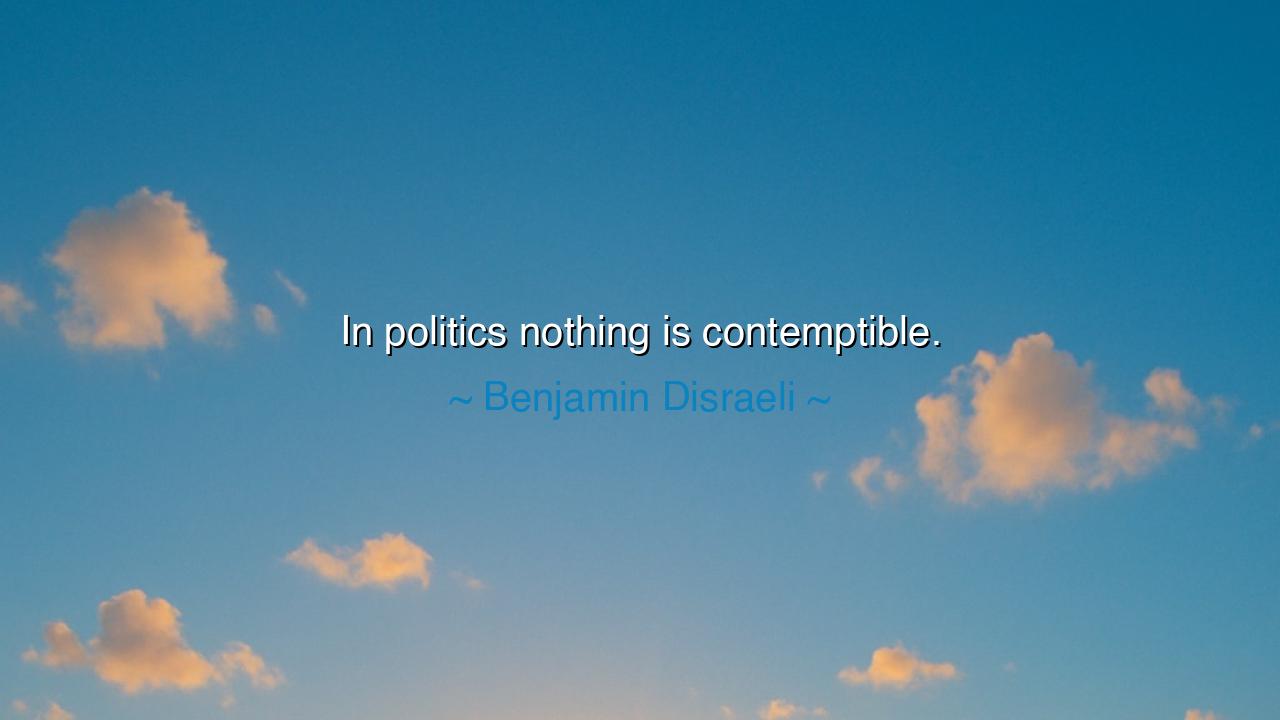
In politics nothing is contemptible.






The words of Benjamin Disraeli, statesman, novelist, and twice Prime Minister of Britain, fall like a sober prophecy: “In politics nothing is contemptible.” With this declaration, he unveils the ruthless reality of politics—that even the smallest act, the most trivial gesture, the most cunning maneuver, can hold within it the seeds of power. To dismiss anything as beneath notice is to court disaster, for the stage of public life transforms whispers into storms and trifles into destinies.
The ancients themselves bore witness to this truth. In Athens, the careless jest of a statesman could turn the Assembly against him. In Rome, a mere rumor whispered in the Forum could topple generals or emperors. What may appear contemptible to the philosopher—flattery, gossip, bribery, or ritual—often proved decisive in the realm of politics. Disraeli, who navigated the storms of party rivalries and royal favor, knew that even the smallest cards played at the right moment could alter the fate of nations.
Consider the tale of Julius Caesar. His decision to cross the Rubicon with but a single legion was, to some, rash and contemptible—a petty defiance of custom. Yet that single act toppled the Roman Republic and gave birth to empire. Or recall Marie Antoinette’s infamous phrase, “Let them eat cake,” whether spoken or not—it was a trifle of words, yet it ignited hatred that fueled a revolution. Thus history affirms Disraeli’s wisdom: in politics, there are no small things, for each carries the weight of consequence.
Disraeli himself lived this maxim. A Jew by birth in a Christian empire, a novelist among career politicians, a man mocked for his flamboyant dress and sharp tongue, he turned what others deemed contemptible into tools of strength. He flattered Queen Victoria, and where others sneered at such sycophancy, he gained her unwavering favor, which in turn secured his place among the greatest of British leaders.
Let the generations remember: the realm of politics is unlike that of philosophy or pure morality. In the struggle for power, even what seems base or trifling may sway the course of nations. To scorn the small is to blind oneself; to recognize its power is to master the game. Disraeli’s wisdom is both caution and call: that in politics, nothing is contemptible, for everything—great or small—can shape the destiny of empires.






ANAnh Nguyen
If 'nothing is contemptible' in politics, is Disraeli implying that all actions, no matter how questionable, can be justified by political ends? Does this suggest that politics is inherently a 'dirty game,' where the means always justify the ends? How does this affect public engagement with politics, and is there a way to reform political systems to ensure higher standards of integrity without sacrificing effectiveness?
KNNguyen Ngoc Khoi Nguyen
How does this quote relate to the manipulation and compromises that often take place in politics? If politics is truly a world where 'nothing is contemptible,' then how do we differentiate between necessary compromises and actions that undermine public trust? Could this attitude contribute to the negative perception of politics as a field where morality often takes a backseat?
MLManh Le
Is Disraeli suggesting that politics is a realm where moral considerations are secondary to achieving power? If 'nothing is contemptible' in politics, what does that say about the ethical boundaries in political decision-making? Should we allow for such flexibility in political actions, or should there be more stringent ethical standards that guide politicians’ behavior, regardless of the situation?
HTLe Thi Huyen Trang
Does this quote reflect the cynicism often associated with politics, or does it point to a deeper reality of political maneuvering? If 'nothing is contemptible' in politics, does that mean that politicians are willing to do anything to achieve their goals, even if it means compromising values? How does this perspective influence our trust in political leaders, and should we accept such pragmatism as an inevitable part of the political process?